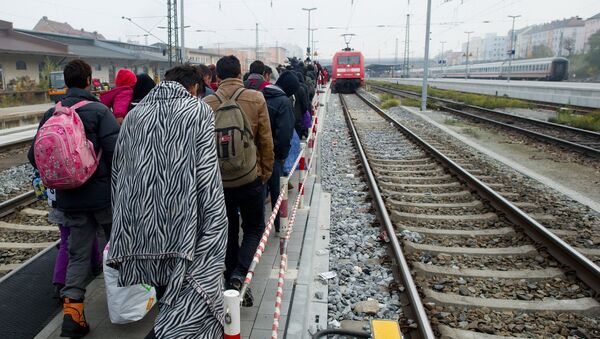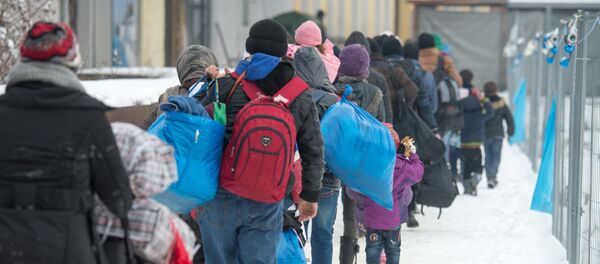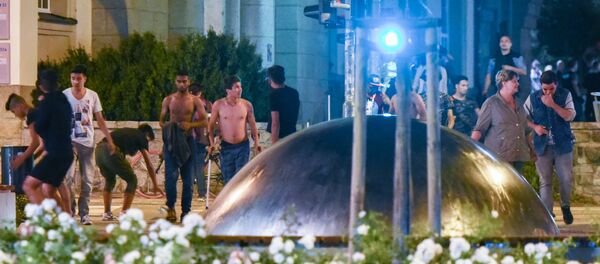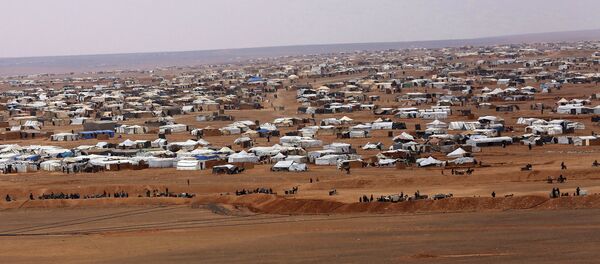According to Bild, between 2014 and the beginning of 2019, the Federal Office for Migration and Refugees referred thousands of cases of "crimes under international law" to the Federal Criminal Police Office and the attorney general. However, out of some 7,000 referred cases, only 129 were investigated.
Sputnik discussed this with Philip Anderson, migration researcher and academic attached to Regensburg University of Applied Sciences in Bavaria, Germany.
Sputnik: What's your take on the reported inquiry and why, in your view, were the referred cases not investigated?
Strict procedures could not really be followed in that sense, so a lot of the people did come in without being properly registered, without there being any clear sense of what the background was and the exact identity was, and what might be part of the biographical setup. I think that structural fact in the course of 2015, the overload of networks was one important aspect.
READ MORE: New German CDU Leader Intends to Overhaul State's Migration Policy
Sputnik: How critical do you think these investigations for Germany's security are? We know it's a very sensitive subject, but how critical for German security is it?
Philip Anderson: I'd be sceptical, I know this report has come out, but I'd be sceptical in the sense that I suspect there's been something of a backlash in the course of the last 2-3 years, partly because of individual incidents of terrorism, the fact that people coming in as refugees have committed terrorist acts or at least horrible acts of violence, and that's led to a real sense of unsettlement with regards to the potential terrorist danger; a lot of extremists having got in under the screens, or under the level of monitoring, so to speak. But I would suspect that it's slightly overblown.
I'd imagine, particularly in view of the terrorist acts that have taken place whether in Berlin near the Christmas market a couple of years ago or elsewhere, there's been a fairly rigorous investigation of people who have a potentially suspicious background.
So I suspect this might be an overblown factor. Although what I refer to as a backlash is partly a tendency of large parts of society after this window of opportunity in 2015, lots of people being allowed in for humanitarian reasons, there's been a reaction against that and the tendency to tar many refugees under the same sort of brush of being potential threats or at least uncertain candidates, in terms of their security status, but I think experience has shown over the last 2-3 years, if there are any indicators of people having a potentially extremist background, then that it is looked into fairly rigorously, and I think the security agencies in Germany are pretty close on the ground to any kinds of activities that might be going on.
READ MORE: UK Landlords Law Checking Illegal Migrants "Discriminatory", High Court Rules
Sputnik: The question I've got is what are the chances that some of the war criminals that are currently in Germany, you've answered that to a certain degree, if so, what countries would they be from? There's some irony here in terms of the Second World War, where individuals who carried out war crimes fled from Germany and now in these recent events they have come into the country; it's quite ironic in many ways. Do you have a point of view on that?
Philip Anderson: I mean if that were the case there would be a certain historical irony about that, I'm sure you're right. But I think the context we're talking about here is a different one. The war criminals we're discussing were, I think, those involved in repressing and brutal actions in Syria and also possibly in Afghanistan. I suspect there may be individuals who got in under the radar, but I suspect historical comparisons here would be slightly distorted.
I think it's understandable that people look at German policy with a particular sensitivity and say, "What's going on here? Is there a tendency to conceal things, broken mirrors", this kind of thing.
The historical context of war criminals after the Second World War was the guilt of the German state itself, there were too many people compromised who aided concealment, it was a question of a whole generation's complicity and guilt, and I think this is a different kettle of fish. I think there's a shared interest in finding people who are potential criminals.
I don't want to be too naive about the role of the German state, there would be lots of aspects I'd be very critical of, but I think in this particular case there is no inherent interest in not finding the potential evildoers.
READ MORE: Foreign Daesh Brides Isolated for Assaulting 'Infidel' Refugees at Syrian Camp
Sputnik: How do these investigations happen and how long will they take?
Philip Anderson: I think there's a certain amount going on. There's been pressure put on the Ministry of Interior to follow this more closely, and that's quite right. I think it's important that a vigilant media follows up this issue in the course of the next few weeks and the course of the next few months.
We look more closely at these people where there could be a lot of potentially threatening characters and I think that's a projection of guilt by association which we should be very suspicious of. The vast majority of people are people here seeking asylum and trying to start new lives, the huge majority of people, that's what we should bear in mind.
Views and opinions, expressed in the article are those of Philip Anderson and do not necessarily reflect those of Sputnik







